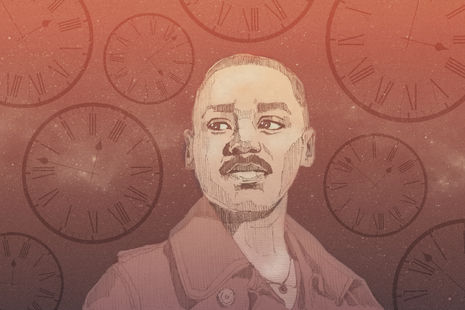The curious incident of The Doctor in the TARDIS
Ollie Godkin reviews Ncuti Gatwa’s uneven run as Doctor Who, and whether BBC’s longest-running sci-fi has run out of time

As the longest running science-fiction TV show in the world, Doctor Who is certainly a unique show, as British as Paddington or The Beatles. With Ncuti Gatwa’s recent surprise exit and a spin-off series coming next year, I thought it would be prudent to reflect on Gatwa’s short run as the eponymous Time Lord and examine where this new version of the show succeeded, where it fell flat and the show’s uncertain future.
On paper, Gatwa’s run should have been a walk in the park. Not only did the BBC secure a young, charismatic frontman in the form of Gatwa, but also a fresh wave of publicity following the brief return of David Tennant, and former showrunner Russell T Davies. Disney also partnered with the BBC, allowing for a doubling of the production budget. Yet in just three years, Gatwa is now out, viewership figures are down, and Disney’s continued involvement is no longer guaranteed, with the BBC recently saying the show will continue “with or without Disney,” leaving the future of the show uncertain for the first time in decades.
“In just three years, Gatwa is now out, viewership figures are down, and Disney’s continued involvement is no longer guaranteed”
Gatwa’s two seasons are a mixed bag, with some episodes feeling little more than filler, and others begging for a longer runtime for their narrative. However, I think Gatwa’s run deserves some more merit. Gatwa’s Doctor is more flamboyant than previous iterations, unafraid to show emotions, and openly queer (see his one-episode fling with Glee’s Jonathan Groff). Gatwa could also easily switch to a darker and frighteningly intimidating persona when called for. This versatility was a welcome change from the one-note previous seasons written by Chris Chibnall, where The Doctor lacked emotional depth, stripped of their complex underlying motivations. Gatwa’s run saw several inventive story concepts like S1E4 ‘73 Yards’ and S2E4 ‘The Well’, proving the show still has new angles and stories to tell after 60 years. Additionally, the brief return of Jodie Whittaker’s 13th Doctor gave some well-deserved reparation to her character, showing how compelling an actress she can be when given a good script. These positives are too often glossed over, with focus on missed opportunities rather than successful improvements to the show’s character.
These positives, however, were frustratingly elusive throughout both seasons. Davies’ writing, while a step above Chibnall’s, is not the return to form so many hoped. His classic run from the 2000s featuring Christopher Eccleston and David Tennant remains firmly ahead, with more complex villains, compelling character arcs for the Doctor’s companions and greater subtlety in the political message of the show. In contrast, Gatwa’s run featured a rotating roster of shallow one-dimensional villains for the most part, often part of a mythical pantheon of gods, who appeared frequently as part of a vague overall narrative, but fell flat. Belinda Chandra, played by the brilliant Varada Sethu, had great chemistry with The Doctor in her first appearance. She was one of the rare few companions who did not want to travel with The Doctor, which allowed for some friction between the two protagonists. Yet by the end of season two, this friction had inexplicably disappeared, and she was written out for most of the episode.
“This season’s superior Disney budget is not reflected in the show’s overly-saturated visuals”
The biggest drawback of these two seasons is the fact that both only lasted for eight episodes, compared to the usual 12-episode series of the past. Not only did this prevent character development over longer arcs, but when combined with a lack of multi-episode storylines, one or two subpar episodes had a far greater overall impact on the season’s quality. The worst offender of this was S1E1 ‘Space Babies’, which dropped the ball right from the get-go with an unappealing adventure involving a snot monster. Considering it was the first episode and branded as a starting point for new viewers, this likely alienated a lot of the show’s casual audience. Even this season’s superior Disney budget is not reflected in the show’s overly-saturated visuals, and a lack of on-location shoots – something which Whittaker’s run from 2017 to 2022 excelled at.
Finally, Doctor Who seems destined now to be overly reliant on nostalgia, to a point where the show expects viewers to be familiar with classic episodes from 1963 onwards. This was best exemplified by the return of such infamous villains as Sutekh and Omega (last seen in 1975 and 1973, respectively) to play the antagonists in each of Gatwa’s series finales. Doctor Who has a history that is far too rich (and niche) for every viewer to be familiar with. Even the surprise exit of Gatwa, and the return of former actress on the show, Billie Piper, to replace him, left viewers more confused than excited.
Regardless of Gatwa’s unsteady run, a spinoff show, The War Between the Land and the Sea, is set to air in 2026. Disney has yet to renew its deal with the BBC, leaving the production of the show in limbo. I am hopeful – the fact that the show is the BBC’s top drama for under-35s is a sign that the show still has traction. Yet I am fearful of the lacklustre creativity in the writing and the reliance on nostalgia. Doctor Who is at its best when it ventures into darker themes, scarier monsters, and stretches the limits of what’s possible for a TV show. Even the return of David Tennant.
 News / Hundreds of Cambridge academics demand vote on fate of vet course20 February 2026
News / Hundreds of Cambridge academics demand vote on fate of vet course20 February 2026 News / Judge Business School advisor resigns over Epstein and Andrew links18 February 2026
News / Judge Business School advisor resigns over Epstein and Andrew links18 February 2026 News / Petition demands University reverse decision on vegan menu20 February 2026
News / Petition demands University reverse decision on vegan menu20 February 2026 News / CUCA members attend Reform rally in London20 February 2026
News / CUCA members attend Reform rally in London20 February 2026 News / Caius students fail to pass Pride flag proposal20 February 2026
News / Caius students fail to pass Pride flag proposal20 February 2026










